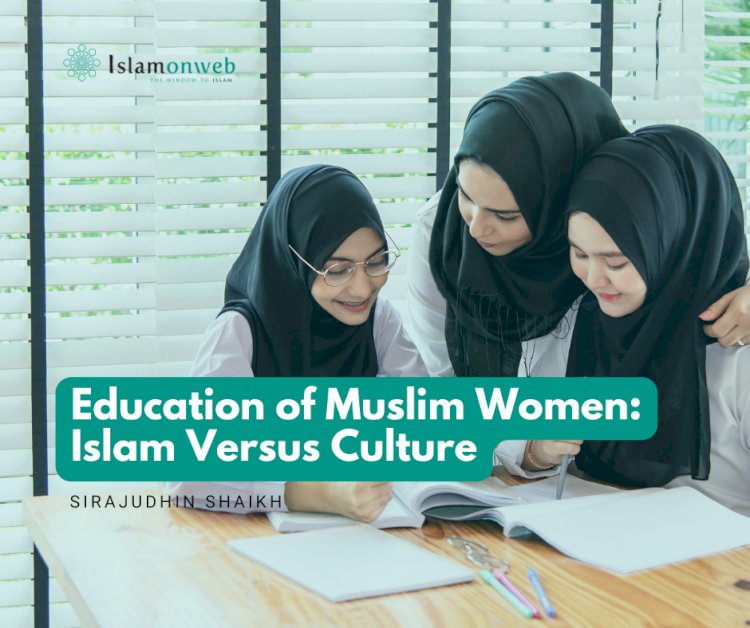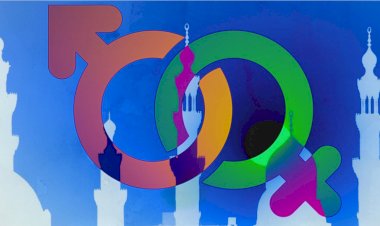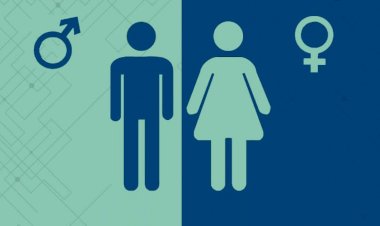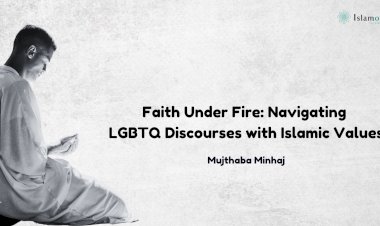Education of Muslim Women: Islam versus Culture
Acquisition of knowledge is sine qua non for all human beings to enable them to have basic information and act according to the principles of the religion. In fact, no religion and no ideology place as much emphasis on education and knowledge as much as Islam does and makes the seeking of knowledge and application of what has been learnt mandatory for both men and women. Thereby, knowledge is one of the indispensable pillars upon which the edifice of Islam has been erected. Notwithstanding, education is a prevalent accusation raised against Islam today and the discrepancy in educational opportunities between men and women in many Muslim countries is often adduced as a primary instance of this.
Female Education in Muslim Countries
There is no preference based on sex in getting access to education in Islam; however, there is a growing misconception among people of other religions that Islam restrains Muslim girls from getting an education. In some Muslim countries such as Nigeria, Pakistan, Ethiopia, Ivory Coast, Burkina Faso, Niger and Yemen, women are subjected to patriarchal norms and varying degrees of restriction on economic participation which reduces the status of women in relation to acquisition and dissemination of knowledge in the society. The approach of some other countries, such as Kuwait, UAE, Bahrain and Libya have discombobulated the entire world eliminating gender gap in schooling and offering gender equivalence between men and women in primary enrolment. There has been an escalating progress of parity in some cases in the proportion of girls compared to boys, as in Indonesia. A similar pattern is visible in Bangladesh where girls outnumber boys in primary as well as secondary schools.
Here the uncertainty befalls that some countries sanction the pursuit of education for women while some others don't. They don't vary due to disperse of principle; but they differ when it comes to putting them into practice. Here the question arises that what actually the Islamic perspective is about education for women and did Islam marginalize women from acquisition as well as dissemination of knowledge. In order to find out the answer, here it is needed to dig out the Islamic traditions and principles premised on Islamic point of view.
Female education in Quran
The Qur'an places the utmost emphasis on the importance of the acquisition and dissemination of knowledge. In the very first revelation of the Qur'an, Allah called for the acquisition of knowledge and said: "Read in the name of your Lord who created, created man from a clinging form. Read! Your Lord is the Most Generous, who taught by means of the pen; taught man what he did not know”. (96:1-5) The verse analysis reveals that Allah ordains the responsibility of acquiring knowledge to human beings regardless of their sex, age or race. Thereby, to connect the pursuit of education to any particular gender is quite censorious and condemnatory.
In another verse, Allah compared the literate and illiterate people and said: “Can they who know and they who do not know be deemed equal?" [But] only they who are endowed with insight keep this in mind!.” (Quran 39: 9). No citation is mentioned in the verse based on sex and no specific person is proffered there.
On another occasion, Allah made His addressee the men intending the whole of humanity. Allah says: "(This is) a Book (the Quran) which we have sent down to you, full of blessings that they may ponder over its Verses, and that men of understanding may remember.” (Quran 38:29) It is essential to mention in this verse that here the pronoun is used by men while the addressee is humankind as it does so in several other places in the Quran when Allah addresses humanity with the pronoun of men as they are the addresses in most of the verses of Quran. This is why women are bound too to exercise the fundamental practices of Islam like prayer, pilgrimage, fasting and almsgiving even if they are revealed in masculine form. Here, in this verse, the thrust of this verse is to make people ponder, think and analyze, thus using their mind power to contemplate and understand, whilst there is no need for distinction between men and women. Here, the Qur’an didn’t clip the wings of the meaning of the verse, rather it tried to extend the scope of its jurisdiction and influence to the furthermost extent of people of understanding by not mentioning any community except the attribute of the community where even women find themselves suitable.
Female Education in Hadith
Apart from these Quranic values, there are several instances, when Prophet Muhammad (ﷺ) has accentuated the significance of knowledge without prioritizing the men. In a hadith Prophet Muhammad (ﷺ) said: “Seeking knowledge is binding/fard for all Muslims.” (Sunan-e Ibn-e Maaja, 224). Here the tradition infers that knowledge acquisition is not right but a responsibility that all Muslims have to abide by, male or female. Here, a point has to be substantiated that the hadith does not carry any gendered pronoun at all. Similarly, on another occasion, the Prophet ﷺ informed how Allah would facilitate the way of a person seeking knowledge. He said: “If anyone travels on the road in search of knowledge, Allah will cause him to travel on one of the roads of Paradise." (Al-Jami al-Sahih, 4, 2074, 2699). This hadith speaks about the superiority of the person who seeks knowledge over the one who doesn't. Here the superiority goes to the person who seeks knowledge, men or women.
In another instance, the Prophet separately introduced the education of girls and the reward he would deserve if he/she teaches her. In Al-Jami’ al-Sahih, Abu Musa Al-Ash’ari narrated that, “The Prophet said, ‘he who has a slave-girl and teaches her good manners and improves her education and then manumits and marries her, will get a double reward; and any slave who observes Allah’s right and his master’s right will get a double [reward]” (Al-Jami al-Sahih, 46: 723)
It should be heeded that this Hadith came when slavery wasn't forbidden in Islam and Islam was just in its early stage. Thereby, it is important to bear in mind that Islamic teachings made a point of educating girls from its embryonic stage in the 7th century and flourished this message through different aspects as Islam spread out. Several such traditions exhort the acquisition of knowledge irrespective in general and don't prioritize a specific gender or community, but all humankind coming under the category of Muslims are compelled.
The aforementioned perspective of the Qur'an and hadith is the genuine stance of Islam about the education of women. There is no occasion when Islam or traditions has restrained women from acquiring knowledge, but it is the people who go astray, constraining women from attaining education. In fact, several instances in history show that women were regarded as scholars and teachers.
Female Scholars in Islam
Take A’isha al-Siddiqa (may Allah be well pleased with her), the youngest wife of the Prophet, for example, who was a Hadith-narrator. She was one of the cynosures of Islamic knowledge after Prophet Muhammad (ﷺ). She is believed to have reported 2,210 traditions which are almost next to impossible without proper knowledge.
On another occasion, ‘A’isha bint Talha (may Allah be well pleased with her), the servant of Aisha at-Siddiqa, reports how people would come to her (A’isha al-Siddiqa) from every city and put forward questions in her court. As she (A'isha bint Talha) was a servant of A'isha at-Siddiqa people would present gifts to her as well as letters as well through her. A'isha bint Talha used to reply to them after soliciting answers from A'isha. This narration testifies that everyone should have access to education. A'isha Siddiqa's servant could read and write.
Apart from this, there are many prominent female Muslim scholars whose achievements are overshadowed by their male counterparts such as Nafisa Bint Al-Hassan, teacher of two of the most prominent scholars of all time, Abu Abdullah Muhammad Idris Al-Shafi’i and Ahmad Ibn Hanbal, Umm Al-Darda Al-Soghra, lecturer of both men and women in the Damascus Mosque, Shuhdah al-Baghdadiyyah, Known as Fakhr an-Nisa (Pride of Womankind) and "The Writer of Baghdad," Fatima al-Samarqandi, one of the famous Hanafi jurists and scientist of hadith in Syria, Fatima Al-Fudayliyya, teacher of prominent students such Sheikh Omar Al-Hanafi and Sheikh Muhammad Salih.
We can see several examples of female scholars in the contemporary world, who emerge from various parts of world and with various types of background.
Conclusion
In the short run, it could be encapsulated that lack of education has been recognized as a stumbling stone in the way of women's progression in Islam while the conspicuous perspective of the Qur'an and tradition claim something else. Islam does not forbid girls from getting an education, instead, it insists for education. What we see today of scholars’ negative stance on female education is a bit of an approach influenced by their culture and educational background. All they want is for women not to get involved in any sort of trouble due to their gender neither do they appreciate women to be the cause of any stumbling block for both genders during education. In case, there is no gender amalgamation or nothing else is not standing as a hindrance to the safety and security of women, the acquisition of knowledge is never condemned.
In some cases, family law delegates many powers to a man including major decisions about a girl’s life and hence it does not project Islamic law in its true sense. Therefore, those who disapprove of the fact that Islam restrains women from seeking knowledge' are not speaking from a sound religious perspective, but rather a limited and extreme political view that does not represent all Muslims and the position of Islam. Hence, it is better not to tarnish the scintillating image of Islam with such erroneous assumptions and try to understand the true spirit of Islam from the prism of Qur'anic and traditional perspectives rather than what a certain group of people do believe or practice.
References
[1] Abidi, D. A. (2010). Educational Marginalization of Muslim Girls: A Study on the. https://www.iosrjournals.org/ , 5 (4), 68.
[2] Khan, A. (2017). Exploring Confined Spaces of Women Education in Islam: Interrogating the Religion and State Policies for Educational Marginalization. www.muslimsocities.org, 9.
[3] GEORGETOWN INSTITUTE FOR WOMEN, P. A. (2022, 03 29). Retrieved from GIRLS' EDUCATION AND ISLAM: A DIVINE COMMAND WITH HISTORICAL PRECEDENT https://onwardforafghanwomen.org/
[3] Farah Khan, S. G. (2022, 06 01). ISLAM AND WOMEN’S RIGHTS OF EDUCATION: MANDATORY OR FORBIDDEN. Pakistan Journal of Humanities & Social Sciences Research, 03(01), 10. Retrieved from https://journals.wumardan.edu.pk/
[5] Islam Emphasizes On Equal Learning Opportunities For Both Men And Women. (2014, 08 18). Retrieved from http://www.quranreading.com/: http://www.quranreading.com/blog/islam-equal-learning-men-and-women/
[6] Ahdeed. (2021, 09 08). What’s Keeping Muslim Women Away From Schools & Colleges? Retrieved from https://www.youthkiawaaz.com/: https://www.youthkiawaaz.com/2021/09/over-the-years-how-has-female-muslim-participation-in-education-changed/
About the author: Sirajuddin Shaikh is a degree final-year student at the National Institute For Islamic And Contemporary Studies (NIICS), Chemmad,
Disclaimer
The views expressed in this article are the author’s own and do not necessarily mirror Islamonweb’s editorial stance.
2 Comments
-

This is the main problem of our society that they do not dive into the deep teachings of the Quran and Hadith and tend to practice what sounds appropriate to them. Under these conditions, they falter in most of the cases and found themselves misguided at the end of the day. Thank You Sirajuddin Shaikh for coming up with these insights and letting know the society that there is a difference between practice and Islam.
-

-

SIRAJUDDIN SHAIKH
3 years ago
Happy to know Simran you liked the endeavor. Would be quite more grateful if you could share it in your friend circle too. REGARDS
-
























Leave A Comment